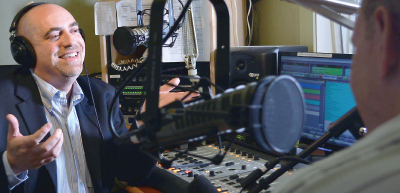‘The Dr. Jim Show’ Battles Stigma in Local Community
Abstract
The show traces its genesis to a local newspaper story about a new community radio station.
If it’s Tuesday in Boise, Idaho, at 3:30 p.m., it’s time for “The Dr. Jim Show.”

Jim Saccomando, M.D., a past president of the Idaho Psychiatric Society, extends psychiatric expertise over the FM airwaves every Tuesday afternoon in Boise, Idaho.
That’s a radio show on the local FM dial (89.9 FM) featuring psychiatrist James Saccomando, M.D., on topics related to mental health, treatment for mental illness, and stigma. He’s often joined by one of his sons—usually, it’s 17-year-old Joe, but if he isn’t available, 14-year-old Jason, or 11-year-old J.B. steps in. The partnerships give the show a relaxed, conversational tone.
“The Dr. Jim Show” is not what you would call overproduced—89.9 FM is a nonprofit community radio station, and the half-hour show shares that spot on the FM dial with indie rock and other low-budget alternative programming.
But the show is making its mark in Boise. “I don’t know how many people are listening, but people will stop me here or there and say, ‘Hey, I heard you on the radio,’ ” Saccomando told Psychiatric News. “I do the show every week with one of my sons. He answers the phone and is also the ‘average Joe,’ asking me questions that many of the listeners may be asking themselves. It helps keep me at a good level for the listeners.”
“The Dr. Jim Show” generally revolves around a theme of some sort and links to some of its 250 shows can be found on its Facebook page. Saccomando usually prepares a theme a couple of days in advance; sometimes he brings in a guest.
Some of the themes that have aired include “Adult Children of Alcoholics,” “Santa Claus and the Parent Conspiracy,” “Separation Anxiety and Selective Mutism,” and “Hallucinogens and Mental Health.”
“There have been a couple of subjects that always get a lot of calls,” Saccomando said. Marijuana is one of them. “Apparently people think marijuana treats everything.”
Saccomando has a voice in the community in other ways, including as immediate past president of the Idaho Psychiatric Association (IPA). When Idaho passed legislation making it the fifth state to grant psychologists prescriptive authority earlier this year, Saccomando and other IPA leaders worked to include requirements in the law to make the training as rigorous as possible.
“Our legislative environment is one in which most legislators want to allow people to make their own decisions,” he said, “and that includes allowing them to make their own mistakes. They didn’t want to listen to us tell them what isn’t good for them—they didn’t want to hear us tell them that psychologists don’t have the training to prescribe medicine. This bill was going to pass anyway, so we stayed at the table and pushed for a rigorous educational curriculum. Our logic was that since the law in Idaho already mandates a two-year curriculum for nurse practitioners to prescribe, then psychologists who want to prescribe should have to meet at least those prerequisites. We aren’t thrilled with the law, but we knew that if we walked away from the table, patients would get hurt.”
“The Dr. Jim Show” has been airing for five years. “It started in May 2012,” he recalled. “A couple of years before, I was at lunch and someone left a local newspaper on the table. I glanced at it and saw a story about a new community radio station in town. I always wanted to do something like that, so I proposed a show about mental health and mental illness.”
There was a learning curve—mastering the operation of the radio board and the rules of being on air. “The first couple of times I was by myself talking—that was kind of boring, so I started bringing in one of my kids,” he said. “That’s been fun. People like Joe.”
Saccomando likes a good story, and it was the stories that attracted him to psychiatry. “I majored in engineering in college then went into the Air Force after I graduated and got a meteorology degree because the Air Force needed meteorologists,” he said. “But my wife was a nurse in the Air Force, and her stories were so much more interesting than what I was bringing home. We had no kids at the time so we planned to take a pre-med course together—she got deployed to Guantanamo Bay so I went ahead and took the biology course by myself.”
Saccomando went on to get a medical degree, thinking he would go into family medicine. But his rotations in psychiatry and consultation-liaison work exposed him to patients’ life stories. They gripped his interest much more so “than managing someone’s blood pressure,” he said.
Today he has a private practice in Boise and does inpatient work at Intermountain Hospital, seeing children in the St. Alphonsus children’s unit and adults at West Valley Medical Center.
“The Dr. Jim Show” is, for Saccomando, a community service extending psychiatric expertise over the airwaves as well as a way to spend time with his sons.
“It’s entertainment, but I hope and believe it also has helped people be comfortable talking about mental health issues and has diminished stigma,” he said. ■



